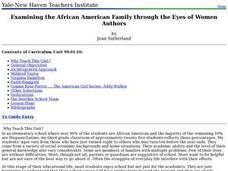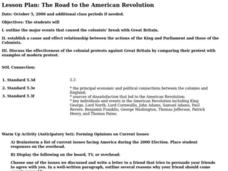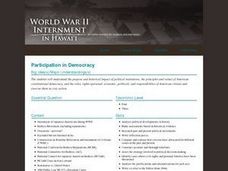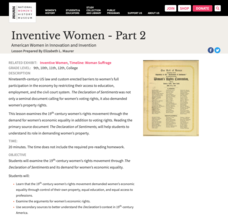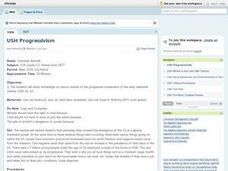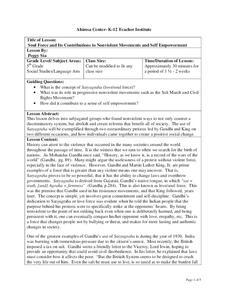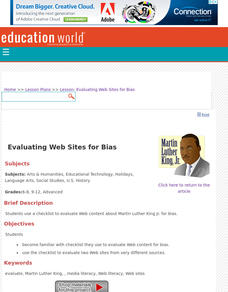Curated OER
Parenting in the Movies:Examining Responsibilities in Modern American Films
Young scholars use films to identify the characteristics of a good parent. In groups, they research the different types of parenting methods used during colonial times, the Civil War and the Civil Rights movement. As a class, they...
Curated OER
Examining the African American Family through the Eyes of Women Authors
Students read stories by women authors on the characteristics of the African-American family. Using the internet, they research the history of issues that have affected African-American families from the Civil War to the Civil Rights...
Curated OER
Forward March: Continuing Frederick Douglass' Footsteps
Students view numerous artifacts from the life of Frederick Douglass. Using the objects, they discover the many parts of his life and develop a hypothesis about the significance of the objects in his life. They identify the...
Curated OER
The Road to the American Revolution
Students consider the case for forming a new, independent nation. In this American Revolution lesson, students examine the people, places, and events that led to the outbreak of war in the colonies. Students compare colonial protests to...
Curated OER
Participating in Democracy
Students analyze film clips in class. In this democracy lesson plan, students identify the differences between civil liberties, democracy and freedom. Students view a video regarding Japanese internment and answer study questions as well...
Curated OER
Martin Luther King, Jr.
Students learn what goals Dr. Martin Luther King, Jr. had when he wanted to change the inequality of the United States.
Curated OER
A Forum on Racism
Twelfth graders compare and contrast the work of Malcolm X and Martin Luther King, Jr. In this racism lesson, 12th graders read The Autobiography of Malcolm X and discuss how Malcolm X and Martin Luther King, Jr. approached ending racism.
National Woman's History Museum
Inventive Women - Part 2
The Declaration of Independence was published in 1776. The Declaration of Sentiments and Resolutions, modeled after the Declaration of Independence, was drafted and read by Elizabeth Cady Stanton at the Seneca Falls Convention in 1848....
West Virginia Department of Education
Declarations and the Quest for Life, Liberty and the Pursuit of Happiness
Understanding how John Brown got his inspiration from the Declaration of Independence helps learners further understand both West Virginia and United States history. The resource, a standalone, uses worksheets, discussion, and essay...
Alabama Department of Archives and History
What Were They Thinking? Why Some Some Alabamians Opposed the 19th Amendment
To better understand the debate over the 19th Amendment, class members examine two primary source documents that reveal some of the social, economic, racial, and political realities of the time period.
Curated OER
Concept Formation Lesson Plan: Understanding "Protest"
After analyzing both examples and non-examples of a variety of protests conducted by ethnic groups in Seattle and the state of Washington during the twentieth century, your class members will work to identify the key ideas and components...
Curated OER
Nativist and Racist Movements in the U.S. and their Aftermath
Students examine the nativist and racist movements in the history of the United States. In groups, they analyze the reactions of religious and ethnic groups to these movements and create a chart to compare the goals of each group. To...
Curated OER
USH Progressivism
Eleventh graders explore, analyze and interpret various strands of the progressive movements of the early twentieth century. They cover the background of child labor laws, Susan B. Anthony's 1873 court speech and alcohol issues in the...
Curated OER
Soul Force and Its Contributions to Nonviolent Movements and Self Empowerment
Fifth graders explore the concept of Satyagraha. In this nonviolent resistance lesson, 5th graders listen to a lecture about Gandhi's teachings and determine how the soul force contributes to a sense of self empowerment.
Curated OER
Fugitive from Labor Cases:
High schoolers examine the cases of Henry Garnett and Moses Honner, both of the 1850s. Students analyze the political climate building up to the Civil War through the lens of these similar cases with different outcomes.
Curated OER
Arguments Against Ratifying the Constitution
Students define federalism, Federalist, and Anti-Federalist, debate issue of ratification in classroom convention, and take vote on whether to add bill of rights. Three lessons on one page.
Curated OER
Using Maps to Uncover a Soldier's Life
Learners investigate maps to examine the life of a Confederate soldier based on troop movements as well as letters and diaries.
Curated OER
What is Prejudice?
Students tell who Rosa Parks was and what she did to become famous and what state she did it in, and who Martin Luther King Jr. was, why he was important in history, and how we was connected with Rosa Parks.
Curated OER
Living Legacies
Young scholars explore the contemporary commemoration of Dr. Martin Luther King, Jr., research the positive impact another famous person has had on society and the images that best represent the actions and beliefs of that person.
Curated OER
Evaluating Web Sites for Bias
Students become familiar with checklist they use to evaluate Web content for bias. They use the checklist to evaluate two Web sites from very different sources.
Curated OER
Write Your Own "I Have a Dream" Speech
Students listen to King's famous "I Have a Dream" speech. They use a fill-in-the-blanks worksheet to express their dreams for the world in a format similar to King's speech.
Curated OER
Reconsidering Malcolm X
Students analyze the strategies and speeches of Malcolm X and Martin Luther King, Jr.
Curated OER
Eyes Worldwide on the Prize
Students examine Martin Luther King, Jr.'s "I Have a Dream" speech and see how it has been produced in China by reading an online article. They study discrimination in the world and write responses to the speech.
Curated OER
Nonviolent Leaders
Students compare the life of Gandhi and other nonviolent leaders. They identify qualities and behaviors of nonviolence. They synthesize the information they research about world leaders and the impact they had.
Other popular searches
- Civil Rights Movement Music
- American Civil Rights Movement
- 1960's Civil Rights Movement
- Jfk Civil Rights Movement
- U.s. Civil Rights Movement
- Us Civil Rights Movement
- Jr. And Civil Rights Movement
- 1960s Civil Rights Movement
- Civil Right Movement Kit
- Jr and Civil Rights Movement
- Civil Rights Movement Unit
- The Civil Rights Movements



